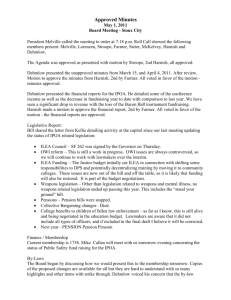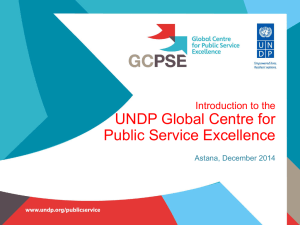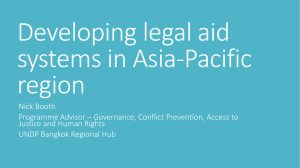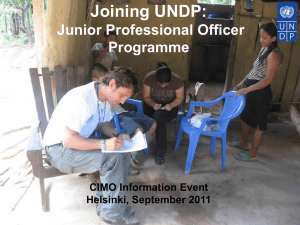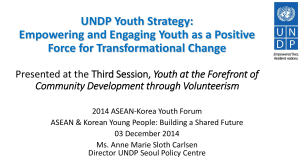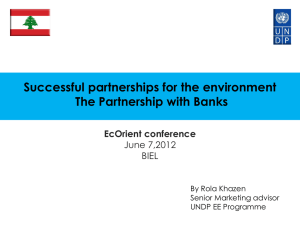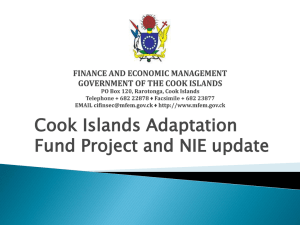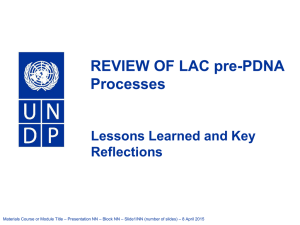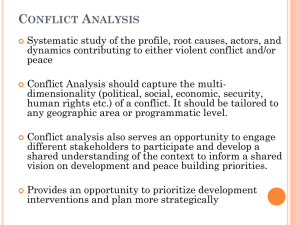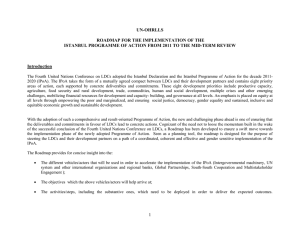presentation - UN
advertisement
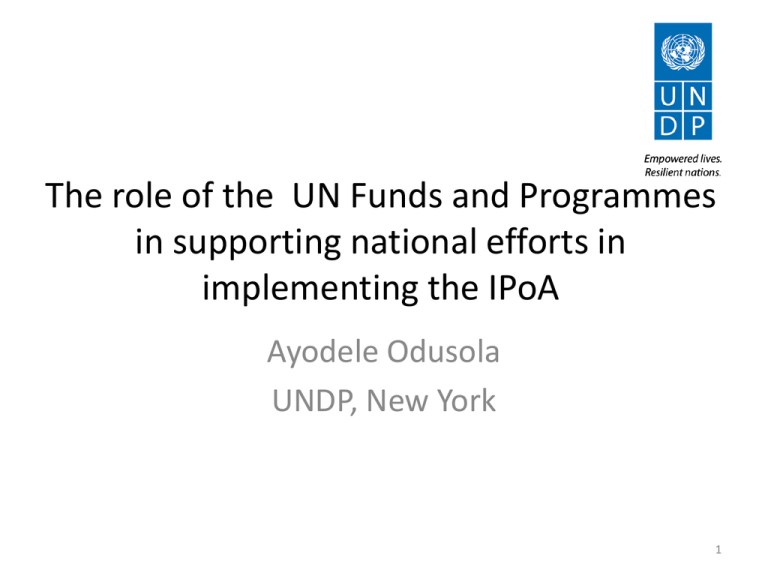
The role of the UN Funds and Programmes in supporting national efforts in implementing the IPoA Ayodele Odusola UNDP, New York 1 Background • UNDP played a key role in supporting the LDC IV preparatory process at the country, regional and global levels. • At its June 2011 annual session, the Executive Board of UNDP, UNFPA, UNICEF, UNOPS, UNWOMEN and WFP mandated the agencies to integrate IPoA into their programmes. • Support to LDCs to be anchored on principles of demand-based assistance and national ownership 2 UNDP’s Role • UNDP has been identified as a key partner to mainstream IPoA into: (i) LDCs’ national development plans and strategies (ii) UN system work programmes of UN Funds, Programmes and specialized agencies. • UNDP is already working in all 48 LDCs to advance sustainable human development 3 Strategy of supporting the implementation of IPoA • Aligning MDG achievement and other development efforts with those identified in the IPoA • A Corporate Task Force has been set up to coordinate the implementation and monitoring of IPoA • UNDP Regional Bureaus have begun to raise awareness among all RCs/RRs/CDs of LDCs to ensure mainstreaming and implementation of IPoA. 4 Strategy of supporting the implementation of IPoA • Using the UNDP’s convening power to ensure: – other UNDG agencies and donors align their activities with this agenda; and – Encourage UNCTs to continue to support nationallevel monitoring of the implementation of the IPoA. • UNDP has systematically encouraged its country offices and UNCTs to explicitly link their programmatic work to the IPOA. Examples include: UNDAF/CPD for Bangladesh, Lao PDR, Myanmar, Nepal, Sudan, Djibouti, Guinea Bissau and Lesotho. 5 UN Agencies collaboration on IPoA • United Nations collaborative actions are focused in four areas: i. building national capacities to deliver basic services ii. mainstreaming the IPoA in national plans and programmes + MDGs, Rio+20, Post 2015 DA; iii. helping youths to develop; and iv. strengthening resilience, including to climate change. 6 Examples of UN collaborative work • Building national capacities – Social Protection Floor Initiative: the Rwandan Government with support from UNDP, UNICEF and other United Nations agencies has established programmes in health, education, housing, social assistance and other sectors in order to improve Rwandans’ living conditions – UNFPA, in collaboration with other UN agencies, is helping LDCs (e.g. Mali, Burkina Faso, Sierra Leone, Madagascar and Benin) to combat child and maternal mortality and enhance access to reproductive services. 7 Examples of UN collaborative work • UNDP, in collaboration with UNOPS and other UN agencies, is building capacity to implement the Enhanced Integrated Framework (EIT) Trust Fund for trade related assistance for LDCs, which was developed to promote economic growth and sustainable development. 8 Examples of UN collaborative work • Mainstreaming IPoA – Through MDG Acceleration Framework (MAF), UNDP in collaboration with other UN agencies are helping Governments and development partners to identify the bottlenecks blocking sustained and inclusive MDG progress and devise ways to overcome them in more than 20 countries (e.g. Burkina Faso, Chad, Lao PDR, Mali, Niger, Tanzania, Togo, Uganda, Benin, CAR, Mauritania and Lesotho). 9 Examples of UN collaborative work – Joint United Nations Programme to Address Violence against Women in Bangladesh is an example of joint action to reach the IPoA goal of increasing the empowerment of women. – Mainstreaming IPoA into CPDs/UNDAFs in Guinea Bissau, Mali, Lesotho, Sudan, Djibouti, Lao PDR, Myanmar, Nepal and Bangladesh and Joint Vision Document in Sierra Leone 10 Examples of UN collaborative work • Helping youth develop – At the 2011 UN Nations High-level Meeting on Youth, more than 25 heads of United Nations entities signed a joint statement which commits them to supporting a comprehensive youth development agenda at the country level – The Regional Programme for Social Cohesion and Youth Employment is bringing together UNDP, ILO, UNESCO and UNIDO to help 12 sub-Saharan countries (e.g. Côte d’Ivoire, Gambia, Guinea, Guinea-Bissau, Liberia, Lesotho, Malawi, Senegal and Sierra Leone) design macroeconomic policies that promote youth employment and help youths develop their skills. 11 Examples of UN collaborative work • Strengthening resilience – Through the Supporting Integrated and Comprehensive Approaches to Climate Change Adaptation programme, UNDP, in partnership with UNIDO, UNICEF, UNOPS and WFP, is helping more than 20 countries, including LDCs, address climate change risks and opportunities in their national development plans. – In Uganda the government and the United Nations have launched a Joint Programme on Climate Change under the leadership of WFP and the participation of UNEP, OCHA and UNFPA – focusing on mitigation and adaptation planning, finance, advocacy, lessons learned and research 12 Examples of UNDP support to LDC IV Monitoring work • UNDP has been supporting the “LDC IV Monitor”, which is a new global Partnership Initiative for the independent Monitoring of the Istanbul Programme of Action (IPoA). • Through research and analysis, policy dialogue, expert group meetings, and other outreach activities, the group (comprising a number of civil society and related organisations in Asia, Africa and Europe) aims to complement the official monitoring and review mechanism of the IPoA. • The main output of the initiative will be the “First Independent Review on the State of Implementation of the IPoA”, to be published in 2013. 13 Key lessons learned • To build national service-delivery capacities – It is important not to ignore infrastructure – In areas with food insecurity and low rates of school attendance, cash transfers and school feeding have proved to be effective ways of bringing the most disadvantaged to school. – Good data leads to effective planning. • To mainstream the Istanbul Programme of Actions – Develop the capacities of leaders and technical staff. – Seek synergies with the MDG acceleration effort. 14 Key lessons learned • To help youth develop – Support broad-based economic growth. – Improve vocational training curriculums and the facilities available for such training. – Use local labour to carry out United Nationsassisted projects. – Integrate social protection schemes with policies to create jobs and stimulate inclusive and equitable economic growth. 15 Key lessons learned • To strengthen resilience, including to climate change – Build on synergies between the fight against poverty and action to address climate change – Address the connections linking climate change, infrastructure and communities. – Foster the development of social protection systems – Ensure necessary resources are available 16 THANK YOU 17
